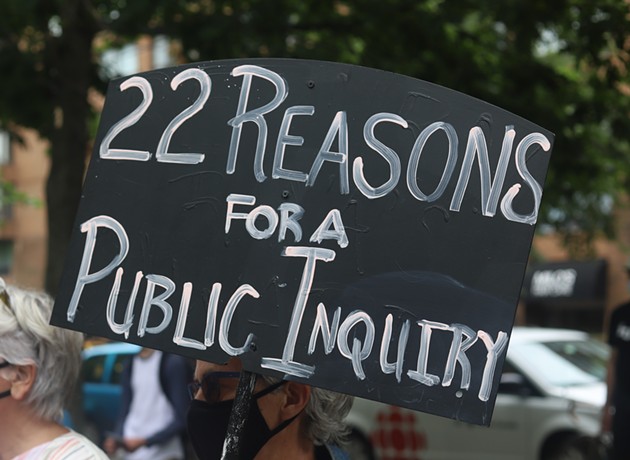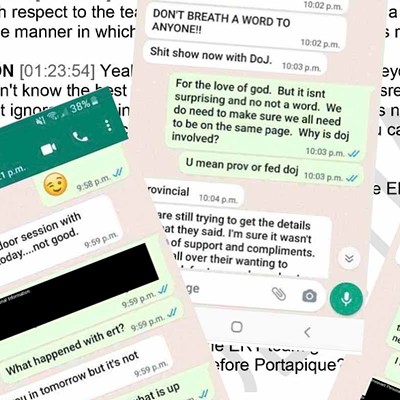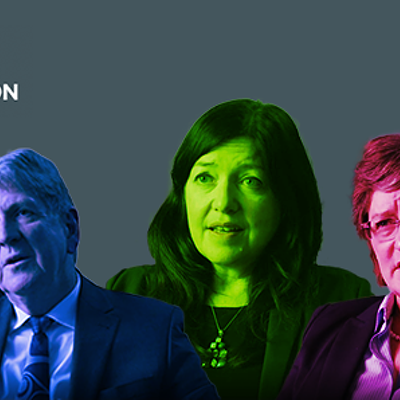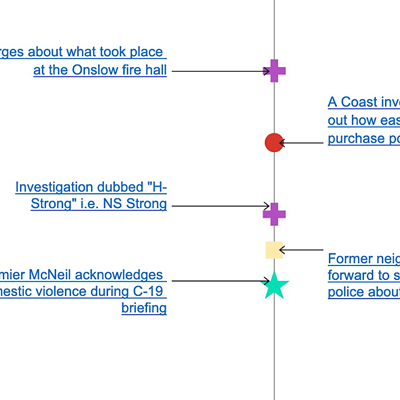In the release, RCMP say they have charged three people with supplying ammunition to the gunman in advance of the killings.
“The gunman’s relationships with others was very much a part of this investigation and, as with every piece of information, were analyzed as we pieced together the gunman’s actions, motives and the potential for others’ involvement,” says the release.
At least one of those people is a victim herself—the common-law spouse of the gunman who was forced to hide in the woods for hours while he carried out his rampage.
Eight months ago, the RCMP confirmed this themselves at an April 24 press conference. “The victim managed to escape from the gunman and hid overnight in the woods,” said superintendent Darren Campbell, going on to add, “After 0630, at daybreak, a victim emerged from hiding after she called 911.”
In the recent release, police say they don’t have any new reason not to trust the victim. “Based on the investigation to date in which those charged cooperated, these individuals had no prior knowledge of the gunman's actions on April 18 and 19,” police say.
RCMP have not taken any questions about the new release since it was issued, citing the ongoing public inquiry.
However, the public has lots of questions. Most importantly, why are we charging a domestic violence victim with aiding her abuser?
“We know that women can be coerced into crime because of their vulnerabilities if they’re captive in a violent relationship,” says Linda MacDonald, one of the co-founders of Feminists Fighting Femicide Nova Scotia (FFF).
The FFF group has been asking similar questions since the shooting first happened in April. As soon as there were inklings the situation was tied to domestic violence, MacDonald and others began demanding a feminist analysis of the shooting and a domestic violence lens.
“I’m concerned that if we don’t keep hounding around the feminist analysis, that they might just look at the violence that happened in Portapique in relation to the killer and his partner and neighbours, and address that and forget about the larger social context,” says Jeanne Sarson, another of the group’s co-founders.
A release from the Feminists Fighting Femicide says this charge has already fueled a rise in misogyny and victim-blaming. “I watch different Facebook conversations and the victim-blaming has gone up through the roof now, saying ‘well yeah, we knew all along that she was not innocent in this’, and ‘we believe she was part of the crime’, and ‘this is only the beginning,’” MacDonald tells The Coast.
Those conspiracies will no doubt harmful to other domestic violence survivors, says Emily Stewart, executive director of Third Place Transition House in Truro. "I began to think about how this information is sitting with women who might be living with their abuser, worried about the implications of leaving," Stewart says in an email to The Coast.
Stewart was surprised to see the RCMP revealed the victim's name in no uncertain terms. "It is unusual in our line of work to see the name of a victim of domestic violence go public," she says. "Even in our internal communications, we use initials as we have a duty to provide confidential services."
It's well-known to people who work with domestic violence survivors how their abusers manipulate and control their victims.
"It is not easy to say no to someone who has power and control over you, whether it be in terms of physical, emotional, financial or psychological abuse, even when what you are being asked to do breaks the law," Stewart explains. "Often, death threats or threats to harm the women, her family, friends, or even pets are made in abusive relationships. The fear that these will be acted on is paralyzing and is a coercive control tactic that we see far too frequently in our work."
The release from RCMP also came just two days before the National Day of Remembrance and Action on Violence Against Women on December 6. That day also marked the thirty-first anniversary of the École Polytechnique shooting in Montreal, where 14 young women were murdered by a gunman who was “fighting feminism.” November 25 through December 10 are also the 16 Days of Activism Against Gender-Based Violence in Canada.
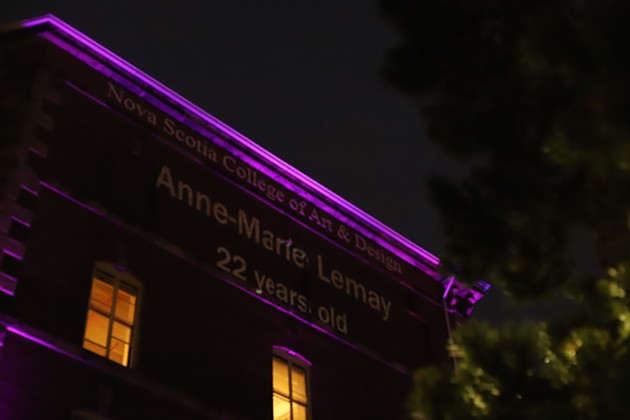
Despite the charges, MacDonald doesn’t think this changes the credibility of the victim’s story. “The women who had the courage to come forward and tell, I still respect them and I believe them. As a feminist, I believe them,” says MacDonald. “I’m not going to be pulled down this spiral into misogyny and victim-blaming, it can’t go there.”
MacDonald hopes that the joint public inquiry between the federal and provincial governments will clarify who’s at fault and not blame the victims. “The RCMP aren’t driving the inquiry, so I still have faith in the inquiry. And I have trust in Kim Stanton, I’ve heard she comes very highly regarded,” she says of the inquiry’s latest appointee.
The three-person inquiry’s interim report will not be released until May 2022, and the final report will come in November of that year. MacDonald hopes FFF Nova Scotia or other feminist groups will be asked to testify. “I have trust that a group of us will be able to testify and that we’ll be able to get our voice out there and bring that element in of the feminist analysis,” says MacDonald. “As feminists, we have a responsibility to socially talk about patriarchy and how it impacts on our culture and how it causes risks for children in our community, and men and women.”
Until then, Nova Scotians are left in the dark, asking questions and speculating.
Editor's Note: The Transition House Association of Nova Scotia provides 24/7 support services to women who are experiencing abuse. If you or someone you are concerned about is experiencing abuse, please call or text 1-855-225-0220 to talk to someone who can help.

